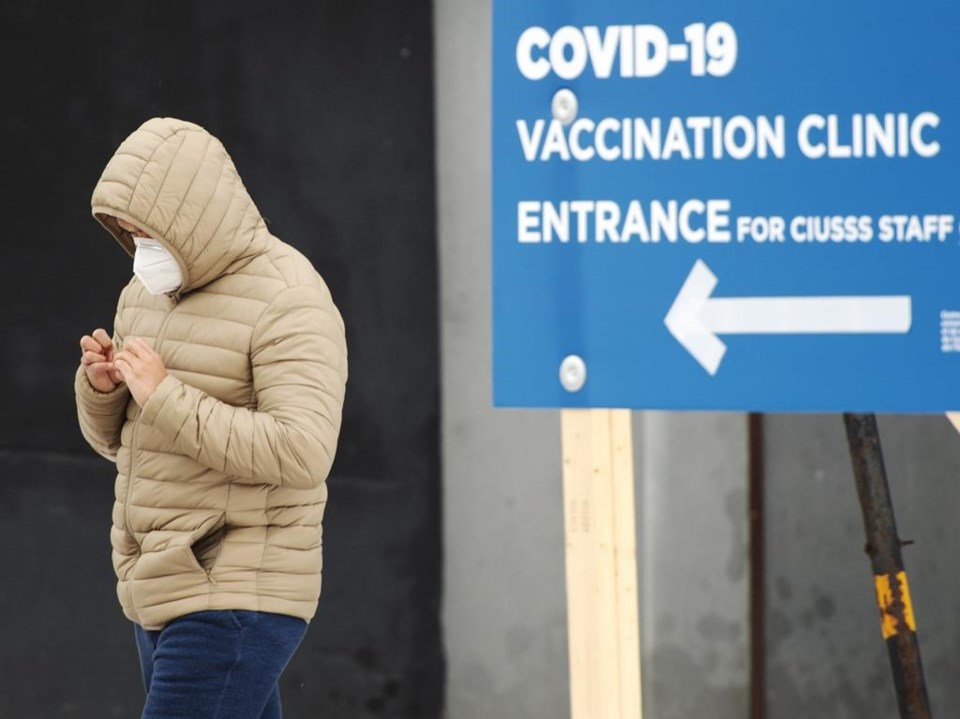MONTREAL — Quebec will wait up to 90 days before giving a COVID-19 vaccine booster to people who have received a first shot, Health Minister Christian Dube said Thursday.
That delay goes far beyond the recommendation of vaccine manufacturers Pfizer and Moderna, which propose intervals of 21 and 28 days, respectively, and is more than double the 42-day maximum delay proposed by Canada's national vaccine advisory committee.
Dube told a news conference that the decision was made in order to vaccinate as many vulnerable people as possible and to reduce the pressure on the health system.
"In our context, this is the best strategy, because we have to contend with (having) very few vaccines, and we’re in a race against the clock," Dube told a news conference.
He said the province had discussed its decision with vaccine manufacturers and with federal public health officials. The latter, Dube said, acknowledged that the 42-day recommended maximum can be extended depending on the disease's progression in a particular province.
He said the high rates of community transmission, hospitalizations and deaths in Quebec justified the change. "In Quebec, we don’t have the same situation as in New Brunswick or British Columbia," he said.
Richard Masse, a senior public health adviser, said the change would allow up to 500,000 seniors who are most at risk of complications — including those in private residences and those aged 80 and up — to receive their vaccine several weeks earlier than originally thought.
Masse said the justification to extend the interval was based on the "experience of working with many vaccines through time," which shows, he said, that vaccine immunity does not suddenly drop off within a month or two.
He said, however, the province was carefully monitoring the efficacy of the vaccines and would immediately give second doses if authorities saw evidence of decreased immunity in certain groups, such as the elderly.
Health officials, Masse said, were investigating why an unspecified number of elderly nursing home residents who had received their first dose in December had since tested positive for COVID-19.
Two of the facilities where vaccinations took place were experiencing outbreaks before shots were delivered, he said. Masse also noted that the body takes up to 14 days to build immunity against the virus, meaning, he said, that those who had received a shot but who had been exposed before that interval would be less protected.
Some residents, however, had tested positive more than 14 days following their injection. Health officials, Masse said, were trying to find out why. He said possibilities include the vaccine is not perfectly effective, or that it may not work as well in some age groups.
"Ninety three per cent (effective) is not 100 per cent, and it could be lower than that for people who are elderly," he said.
Both Masse and Dube said the province would work to shorten the interval between first and second doses once the province begins receiving larger quantities of vaccine — likely in March or April, they said.
Meanwhile, Quebec reported Thursday that some regions had few or no doses of COVID-19 vaccine remaining as the vaccination rate outpaced delivery.
As of Thursday morning, the Health Department said the Gaspe region, Iles-de-la-Madeleine, Nord-du-Quebec and the James Bay Cree Nation territories were out or almost out of vaccine, adding that it expected new deliveries Friday or Saturday. Four other regions had almost used up all their doses but received new supplies Tuesday.
Jean Morin, a spokesman for the Gaspe region's health authority, said the vaccination campaign was going "exceedingly well" despite the fact nearly all the doses had been used. Morin said there are logistical challenges to vaccinating people in the vast and thinly populated region, including having to transport people to clinics to receive their shots.
Dube recognized the federal effort being made to get vaccine to the provinces, but said he wished it would go more quickly because the need is so great. “We recognize the effort but we’re not satisfied, because we have so many people we want to vaccinate," he said.
The province reported 2,132 new cases of COVID-19 Thursday and 64 more deaths attributed to the novel coronavirus, including 15 that occurred in the previous 24 hours. Quebec has reported a total of 236,827 infections and 8,878 deaths linked to the virus.
The province had administered more than 115,000 doses of vaccine as of Thursday, including nearly 26,000 to long-term care residents.
This report by The Canadian Press was first published Jan. 14, 2021.
Morgan Lowrie, The Canadian Press

